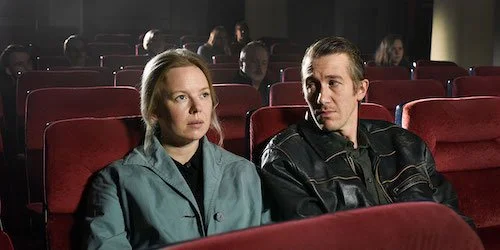Fallen Leaves
Written by Andreas Babiolakis
Warning: The following review is of a film that is part of TIFF 2023 and may contain spoilers for Fallen Leaves. Reader discretion is advised.
Image courtesy of TIFF.
Aki Kaurismäki winks at his audience during his latest (and already cherished) feature film Fallen Leaves. With cinephiles at the forefront — two lovebirds who are continuously the butt ends of their own lives — we see nods to Jean-Luc Godard and Robert Bresson whose films are typically as short as the brief eighty-minute runtime that Fallen Leaves boasts, but there is also more in common here. The uncharismatic tonality of the lead characters Ansa (a citizen of Finland who is down on her luck when it comes to employment and fearful of the raging war between Russia and Ukraine) and Holappa (a blue-collared worker who is battling an alcohol addiction) is purely Godard in nature. Fallen Leaves’ nature as a dismal fable is as Bresson as any modern film can be. While the film examines the nauseous ways of modern-day struggles, it also exalts the cure that one’s passions (in this case, Kaurismäki’s affinity for film) can provide.
It also provides the toxic curse of being in love. Ansa and Holappa are passing ships in the night at first as they both frequent the same nightclub, but they will cross paths again and act upon this chance. Fate is the name of the game as they will either bump into each other serendipitously or have a reason to not reconnect out of spite that luck can bring (Holappa losing Ansa’s number written down on a piece of paper in the wind, for instance). We’re continuously being forced to ask “What will happen next?” in this peculiar dramedy that plays on the fickleness of chance and the depths of misery. Despite all the sorrow and misfortune, Fallen Leaves is one of the most colourful affairs of the year, with works like Scorpio Rising referenced in the colour palette (crimson red and stage-light teal, for instance).
With all of these pleasantries in mind (or their antithesis, anyway), Fallen Leaves was shaping up to be one of the more interesting romantic films of 2023. While I still think it is a great film, Kaurismäki allows the whimsy and spirit of the film to dictate where the narrative should go, and I can only help but think of a couple of missed opportunities as a result. If one of the reoccurring themes is the war in Ukraine, I don’t understand the incessant need to keep bringing it up unless it directly affects the characters in the film, particularly the mentioning of the bombing of hospitals in the news that Ansa listens to and the film’s visit to the hospital being completely unthreatened. I don’t anticipate misery or that only bad will happen, but if Kaurismäki was using the ongoing war just to detail the general state of anguish out there and Ansa’s need to escape or find peace, I think we have more than just one posing threat that he could have featured; by sticking to just one news item, the film leads us to believe that it will personally affect the characters in some direct way.
What Kaurismäki is aiming for instead is love and hope in the most unrecognizable places. Cut the scenes between Ansa and Holappa, place them out of context, and they may seem like the most loveless couple of the year in film. In context, the subdued adoration is there and the juxtaposition between these moments and the sequences around them allows this on-screen romance to radiate. This experiment makes Fallen Leaves worth watching, but then there’s one last farewell rooted in cinephilia as the credits creep up on us. Without spoiling anything else, it’s important to note the final line of the film and what it entails. In a film that name-drops Godard and Bresson whilst featuring posters for works like Brief Encounter (about a romance created by circumstance that wasn’t meant to last), Ansa rescues a stray dog and nurtures it back to full health. When Holappa needs the same affection and healing powers post-hospital visit, he asks about said dog whom Ansa has decided to name “Chaplin”.
When life is forcing you into living a life of Contempt amidst its citizens who are Angels of Sin, Kaurismäki reminds us that we can wind up in a story like Charlie Chaplin’s City Lights instead: with a hopeful ending after the tests of moral strength that came before. Fallen Leaves actually references Chaplin’s Limelight directly, but this is a bittersweet film from an aging auteur who wanted to grace us with one last gem before they bid adieu. Maybe that’s how Aki Kaurismäki views himself through Fallen Leaves, but instead, I see a strong director delivering another worthwhile work who can find love even in the ugliest, most desperate of times: this is City Lights through and through. Now, Ansa, Holappa, Kaurismäki, and we can see.
Andreas Babiolakis has a Masters degree in Film and Photography Preservation and Collections Management from Toronto Metropolitan University, as well as a Bachelors degree in Cinema Studies from York University. His favourite times of year are the Criterion Collection flash sales and the annual Toronto International Film Festival.





